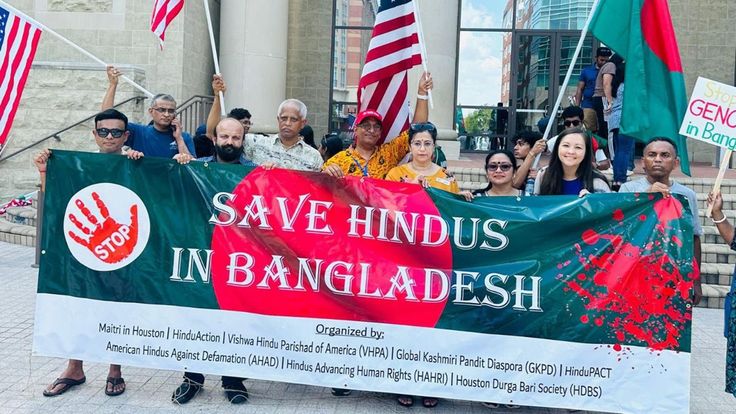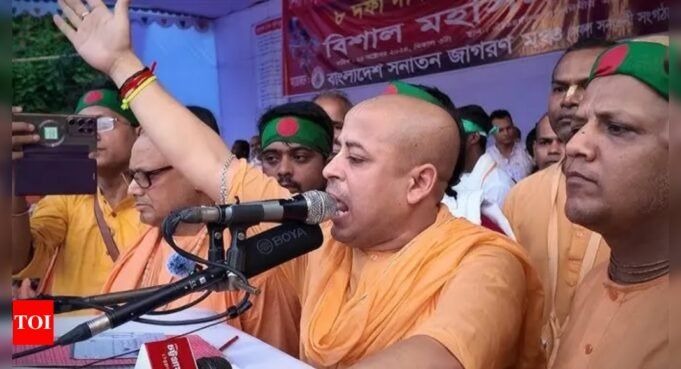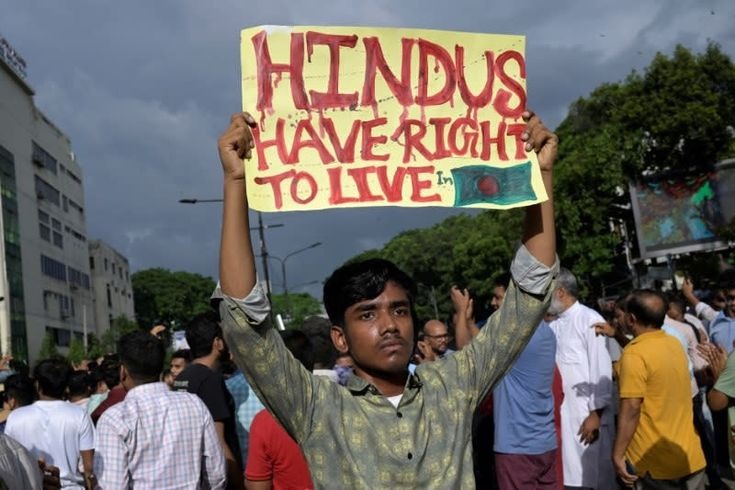Bangladesh government- Collapse
Recent incidents, including attacks during Durga Puja, have highlighted the growing threat of radical extremism. Trending hashtags like #SaveHindusInBangladesh and #JusticeForBangladeshiHindus amplify global calls for action to end this ongoing religious persecution.
WORLD
1/19/20254 min read


The recent upheaval in Bangladesh has unleashed a wave of targeted violence against the Hindu minority, laying bare the systemic persecution they endure. The ousting of former Prime Minister Sheikh Hasina in August 2024 has emboldened extremist elements, leading to heinous attacks on Hindu lives, properties, and places of worship.
Causes of the Unrest
The immediate catalyst for the unrest was public dissent against Hasina's authoritarian governance and controversial policies, such as the job quota system perceived as nepotistic. Student-led protests, which began as a demand for fair employment opportunities, escalated into a broader movement against systemic corruption and lack of democratic freedoms. The government's heavy-handed response, resulting in over 300 deaths and thousands of incarcerations, further inflamed public sentiment.
Following Hasina's departure, the interim government, led by Nobel laureate Muhammad Yunus, struggled to establish order. The ensuing chaos provided an opportunity for extremist elements to target vulnerable communities, particularly Hindus, who have historically been marginalized in the predominantly Muslim nation.
Destruction of Temples and Idols
In a brazen display of intolerance, miscreants vandalized 14 Hindu temples in Thakurgaon district between February 5 and 6, 2023. Idols were desecrated, with some found discarded in ponds, reflecting a calculated attempt to erase Hindu religious heritage.
The situation deteriorated further in December 2024, when Islamist mobs attacked Hindu communities in Doarabazar, Sunamganj. Approximately 130 Hindu houses and 20 temples were vandalized following unfounded allegations of blasphemy. This orchestrated assault underscores the perilous existence of Hindus in Bangladesh.
Public Executions and Murders
The chaos post-Hasina's regime has led to brutal attacks on Hindus. On August 5, 2024, the Chakraborty family in Bagerhat was attacked; the patriarch was killed, and other family members suffered severe injuries. Such incidents highlight the lethal threat faced by Hindus amid political instability.
Detailed Report on Deaths and Atrocities
Between August 4 and August 20, 2024, the Hindu Buddhist Christian Unity Council reported 2,010 incidents targeting minorities, including attacks on 69 temples. Homes of 157 families were attacked, looted, vandalized, and set on fire, with businesses also targeted. Five Hindus were killed in these attacks, at least two of whom were confirmed as Awami League members.
India's Response to the Crisis
Following reports of violence against Hindus in Bangladesh, the Indian government, led by the BJP, expressed serious concerns. The Ministry of External Affairs (MEA) acknowledged incidents targeting Hindus and other minorities, including attacks on homes, businesses, and temples. The Indian government took these reports seriously and shared its concerns with the Government of Bangladesh.
In response to the escalating tensions, the Indian government engaged in diplomatic discussions with Bangladesh. Foreign Secretary Vikram Misri visited Dhaka to address the situation, emphasizing India's commitment to working closely with Bangladesh's interim government to ensure the safety of minorities and maintain bilateral relations.
BJP's Proactive Measures
Prime Minister Narendra Modi publicly condemned the atrocities against Hindus in Bangladesh, urging the Bangladeshi government to take immediate action to protect minority communities. His administration facilitated the safe passage of affected individuals into India, providing refuge and necessary assistance. Additionally, the BJP organized diplomatic dialogues to address the crisis and deployed resources to support humanitarian efforts.
Congress's Silence and Focus Elsewhere
In stark contrast, the Indian National Congress has remained largely silent on the plight of Hindus in Bangladesh. Despite mounting evidence of targeted violence, the Congress has refrained from issuing formal statements or engaging in discussions concerning the safety of Hindus in the neighboring country.
Instead, the Congress has directed its attention to international issues such as the Palestinian situation. Party leaders have participated in debates and issued statements expressing solidarity with Palestine, highlighting a selective approach to human rights concerns that overlooks the immediate threats faced by Hindus in Bangladesh.
Implications of Congress's Stance
The Congress's apparent indifference to the suffering of Hindus in Bangladesh has drawn criticism from various quarters. Critics argue that the party's selective advocacy undermines its credibility and raises questions about its commitment to protecting vulnerable communities, especially when contrasted with the BJP's active measures to address the crisis.
Limited International Condemnation
While some international human rights organizations have acknowledged the attacks, their responses have been tepid. For instance, Amnesty International called on Bangladesh's interim government to protect minority communities, stating: "The new interim government must ensure the rights to equality, non-discrimination and bodily integrity of everyone and bring an end to the revenge culture of attacking political opponents that Bangladesh has witnessed in the past." However, this appeal lacked the urgency and specificity warranted by the severity of the situation.
Neglect by Major International Bodies
Major international bodies, including the United Nations and leading Western nations, have largely remained silent on the issue. This silence is particularly glaring given the scale of the violence, with over 2,000 reported attacks on minorities, including Hindus, within a 16-day period in August 2024.
Opinion Polls and Public Sentiment
A survey conducted in March–April 2023 indicated that nearly half of Bangladeshis are afraid to publicly express their opinions, reflecting a broader climate of fear and repression.
Additionally, a poll from December 2024 showed that 60.4% of city dwellers and 61.4% of rural residents wanted elections within one year, indicating widespread impatience for political stability.
Nationwide Protests and Demonstrations
In the wake of these atrocities, Indian citizens organized mass protests to condemn the violence and demand action. Significant demonstrations occurred in various cities, including New Delhi, where hundreds gathered near the Bangladesh High Commission to voice their concerns. Protesters called for immediate cessation of violence against Hindus and urged the Indian government to take decisive steps to protect the affected community.
Similar protests erupted in other parts of the country. In Jammu, for instance, citizens rallied against the persecution of Hindus in Bangladesh, highlighting the widespread national indignation over the issue.
Public Sentiment and Social Media Outcry
The Indian public's outrage extended to social media platforms, where hashtags condemning the violence trended for several days. Users shared news articles, personal opinions, and calls to action, amplifying the issue's visibility and pressuring authorities to respond.



